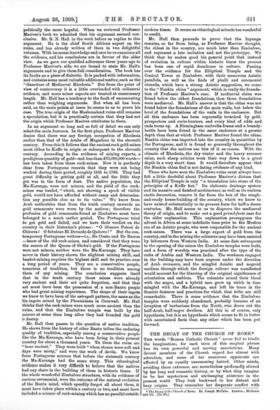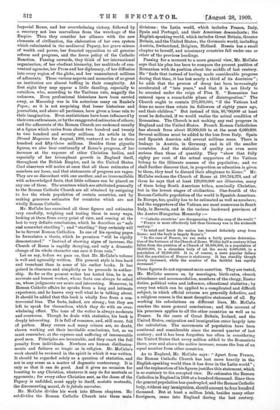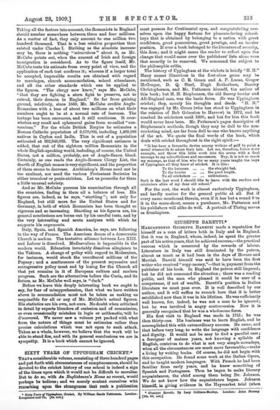THE DECAY OF THE CHURCH OF ROME.* THE words "Roman
Catholic Church" never fail to kindle the imagination ; for each term of this magical phrase has its own powerful and moving associations. Many devout members of the Church regard her almost with adoration, and some of her numerous opponents are affected by an equally unreasoning hatred. Other minds, avoiding these extremes, are nevertheless profoundly stirred by her long and romantic history, or by what they imagine to be her mysterious and unchanging existence in the present world. They look backward to her distant and hazy origins. They remember her desperate conflict with * The Decay of the Church of Some. By Joseph McCabe. London: Methuen and Co. ps. Sa.] Imperial Rome, and her overwhelming victory, followed by a recovery not lees marvellous from the wreckage of the Empire. Then they consider her alliance with the new elements of civilisation, the elaboration of her own system which culminated in the mediaeval Papacy, her grave misuse of wealth and power, her frenzied opposition to all genuine reform and progress, and the fierce policy of the Catholic Reaction. Passing onwards, they think of her international organisation, of her obedient hierarchy, her multitude of con- ventual agencies, her Press and her diplomacy, of her diffusion into every region of the globe, and her unnumbered millions of adherents. These various aspects and memories of so great an institution are almost baffling in their complexity. At first sight they may appear a little dazzling, especially to outsiders, who, according to the Tazitean rule, magnify the unknown. Even professional historians have been carried away, as Macaulay was in his notorious essay on Ranke's Popes ; so it is not surprising that lesser historians and journalists, and above all partisans, have given a loose rein to their imagination. Even statisticians have been influenced by their own enthusiasm, or by the exaggerated estimates of others; and the adherents of the Roman Church are reckoned usually at a figure which varies from about two hundred and twenty to two hundred and seventy millions. An article in the Strand Magazine for August, 1906, ventured so far as three hundred and fifty-three millions. Besides these gigantic figures, we also hear continually of Rome's progress, of her increase at the expense of other Christian bodies, and especially of her triumphant growth in England itself, thronghout the British Empire, and in the United States. Cool observers will notice at once that all these estimates of numbers are loose, and that statements of progress are vague. They are so discordant with one another, and so irreconcilable with acknowledged facts, that little reliance can be placed on any one of them. The numbers which are attributed generally to the Roman Catholic Church are all obtained by assigning to her the whole population of certain countries, and by making generous estimates for countries which are not wholly Roman Catholic.
Mr. McCabe has examined all these figures and estimates very carefully, weighing and testing them in many ways, looking at them from every point of view, and coming at the last to very definite conclusions, which he describes as "safe and somewhat startling"; and " startling " they certainly will be to fervent Roman Catholics. In one of his opening pages he formulates a thesis, which he promises "will be rigidly demonstrated." "Instead of showing signs of increase, the Church of Rome is rapidly decaying, and only a dramatic change of its whole character can save it from ruin."
Let us say, before we pass on, that Mr. McCabe's volume is well and agreeably written. His present style is less hard and trenchant than in some of his earlier books. It has gained in clearness and simplicity as he proceeds in author- ship. So far as the present writer has tested him, he is an accurate and honest worker, whose facts can always be relied on, whose judgments are acute and interesting. Moreover, in Roman Catholic affairs he speaks from a long and intimate experience, and he knows very well what he is talking about. It should be added that this book is wholly free from a con- troversial bias. The facts, in,deed, are strong ; but they are left to 'speak for themselves, which they do with an over- whelming effect. The tone of the writer is always moderate and courteous. Though he deals with statistics, his book is deeply interesting. It is full of romance, and, still more, full of pathos. Many errors ai.d many crimes are, ne doubt, shown working out their inevitable conclusions, but, as we must remember, at the expense and suffering of innumerable good men. Principles are inexorable, and they exact the full penalty from individuals. Nowhere are human disillusion- ments and failures so tragic as in religion. Mr. licCabe's work should be reviewed in the spirit in which it was written. It should be regarded solely as a question of statistics, and not in any sense as a matter of dogmatic controversy. It is only so that it can do good. And it gives no occasion for boasting to any Christian, whatever it may do for neutrals or opponents ; for every other Christian sect, as the doom of the Papacy is unfolded, must apply to itself, mutatis mtdandis, the disconcerting moral, de tsfatncla narratur.
Mr. McCabe divides his work into fifteen chapters. He subdivides the Roman Catholic Church into three main divisions : the Latin world, which includes France, Italy, Spain and Portugal, and their American descendants; the English-speaking world, which includes Great Britain, Greater Britain, and the United States ; the Germanic world, including Austria, Switzerland, Belgium, Holland. Russia has a small chapter to herself, and missionary countries fall under one or
other of the previous headings.
Passing for a moment to a more general view, Mr. McCabe
says that his plan has been to compare the present position of Romanism with its position about the middle of last century. He "finds that instead of having made considerable progress during that time, it has lost nearly a third of its dominion"; he adds that the process of decay has been increasingly accelerated of "late years," and that it is not likely to be arrested under the reign of Pius X. "Romanism has entered upon a remarkable phase of disintegration." The Church ought to contain 270,000,000, "if the Vatican had done no more than retain its followers of eighty years ago, and their children." But instead of this, 80,',00,000 at least
must be deducted, if we would realise the actual condition of Romanism. The Church is not making any real progress in England and the United States. French Roman Catholicism has shrunk from about 36,000,000 to at the most 6,000,000. Several millions must be added to the loss from Italy. Spain and Spanish America add several millions more. There is leakage in Austria, in Germany, and in all the smaller countries. And the statistics of quality are even more serious than those of quantity. They "show that fully eighty per cent, of the actual supporters of the Vatican belong to the illiterate masses of the population; and we
shall further discover that, in proportion as education is given to them, they tend to discard their allegiance to Rome." Mr. McCabe reckons the Church of Rome at 190,764,378, and of these he says that at least 120,000,000 are illiterates, many of them being South American tribes, nominally Christian, but in the lowest stages of civilisation. One-fourth of the Roman Catholic population of the world is Spanish-American. In Europe, too, quality has to be estimated as well as numbers; and the supporters of the Vatican are most numerous in South Italy, in Bavaria, and in the various backward provinces of the Austro-Hungarian Monarchy :— " Catholic countries' are disappearing from the map of the world." "France is mom effectively lost than Germany was in the sixteenth century."
"In mind and heart the nation has turned definitely away from Rome ; and the fault is largely Rome's."
"In the case of France, we can make a fairly precise determina- tion of the fortunes of the Church of Rome. Within half-a-century it has fallen from the position of a Church of 30,000,000, in a population of 36,000,000, to a shrunken body of (at the mo it) 6,000,000, in a population of 39,000,000. It is, of course, a mere popular fallacy that the population of France is stationary. It has steadily though slowly increased, while the number of the faithful has rapidly decreased?'
These figures do not represent mere assertion. They are tested, Mr. McCabe assures us, by marriages, birth-rates, church attendance and accommodation, numbers of the clergy, Easter duties, political votes and influence, educational statistics ; by every test which can be applied to a complicated and difficult subject, in which official returns are generally defective, and a religious census is the most deceptive statement of all. By working his calculations on different lines, Mr. McCabe reaches the same general conclusions; and this account of his processes applies to all the other countries as well as to France. In the cases of Great Britain, Ireland, and the United States, emigration and immigration enter largely into the calculation. The movements of population have been continual and considerable since the second quarter of last century ; and it has been forgotten too often in considering the United States that every million added to the Romanists there, over and above the native increase, means the loss of an equal number from other countries.
As to England, Mr. McCabe says : "Apart from France, the Roman Catholic Church has lost more heavily in the English-speaking world than it has done in the Latin world " ; and the explanation of his figures justifies this statement, which is so contrary to the accepted view. He estimates the Roman Catholics in England in 1800 at a hundred thousand. Since then the general population has quadrupled, and the Roman Catholic body, without any immigration, should amount to four hundred thousand. But at least a million Irish, besides many other foreigners, came into England during the last century. Taking all the factors into account, the Romanists in England should number somewhere between three and four millions. As a matter of fact, they only amount to one million two hundred thousand. That is a less relative proportion than existed under Charles I. Striking as the absolute increase may be, there is nothing "miraculous" about it, as Mr. McCabe points out, when the amount of Irish and foreign immigration is considered. As to the figure itself, Mr. McCabe tests his estimate from every point of -view, and the application of each test confirms it; whereas if a leiger total he accepted, impossible results are obtained with regard to marriages, church accommodation, school attendance, and all the other standards which can be applied to the figures. "The clergy now know," says Mr. McCabe, "that they are fighting a stern fight to preserve, not to extend, their domain in England." So far from gaining ground, relatively, since 1850, Mr. McCabe credits Anglo- Romanism with a loss of about two millions on what their numbers ought to be at a normal rate of increase. The leakage has been enormous, and it still continues. It over- whelms any small and ephemeral gains from so-called "con- 'versions." For the whole British Empire he estimates a Roman Catholic population of 9,570,000, including 1,489,588 natives in Ceylon and India. This is out of a population estimated at 392,846,835. The very significant estimate is added, that out of the eighteen million Romanists in the whole English-speaking world, including, of course, the United States, not a million, probably, are of Anglo-Saxon blood. Certainly, as one reads the Anglo-Roman Clergy List, the dearth of English names is very significant, and the proportion of them seems to decrease. Archbishop's House need not be too exultant, nor need the various Protestant Societies be either truculent or panic-stricken. Let us prescribe for them a little unusual sobriety.
And so Mr. McCabe pursues his examination through all the countries, finding in them all a balance of loss. His figures are, indeed, as he says, " startling "; not only for England, but still more for the United States and for Germany, in both of which Romanism has been thought so vigorous and so increasing. Startling as his figures are, his general conclusions are borne out by his careful testa, and by the very interesting and acute analyses with which he supports his arguments.
Italy, Spain, and Spanish America, he says, are following in the way of France. The American dream of a democratic Church is useless. The tentative alliance between Leo XIII. and Labour is dissolved. Mediaevalism is impossible in the modern world. Education invariably dissolves allegiance to the Vatican. A change of policy with regard to Modernism, for instance, would shock the uncultured millions of the Papacy ; and a continuance of the present repressive and retrogressive policy must end by losing for the Church all that yet remains in it of European culture and modern progress. Such are the alternatives before the Curia, and its future, as Mr. McCabe well says, is "dark."
Before we leave this deeply interesting book we ought to say, for fear of misapprehension, that what we have written above in commendation must not be taken as making us responsible for all or any of Mr. McCabe's actual figures. His statistics are his own, not ours. No doubt when criticised in detail by experts blunders of omission and of commission, or even occasionally mistakes in logic or arithmetic, 'will be discovered. We never saw a volume yet packed -with what from the nature of things must be estimates rather than precise calculations which was not open to such attack. Taken as a whole, however, we believe that the work will be able to stand fire, and with its general conclusions we are in sympathy. It is a. book which cannot be ignored.








































 Previous page
Previous page